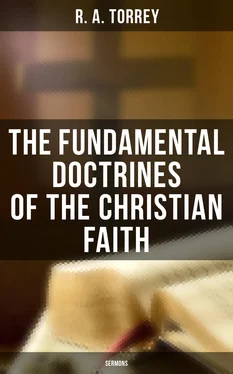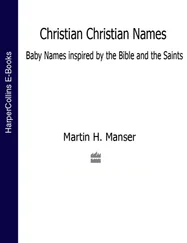R. Torrey - The Fundamental Doctrines of the Christian Faith (Sermons)
Здесь есть возможность читать онлайн «R. Torrey - The Fundamental Doctrines of the Christian Faith (Sermons)» — ознакомительный отрывок электронной книги совершенно бесплатно, а после прочтения отрывка купить полную версию. В некоторых случаях можно слушать аудио, скачать через торрент в формате fb2 и присутствует краткое содержание. Жанр: unrecognised, на английском языке. Описание произведения, (предисловие) а так же отзывы посетителей доступны на портале библиотеки ЛибКат.
- Название:The Fundamental Doctrines of the Christian Faith (Sermons)
- Автор:
- Жанр:
- Год:неизвестен
- ISBN:нет данных
- Рейтинг книги:4 / 5. Голосов: 1
-
Избранное:Добавить в избранное
- Отзывы:
-
Ваша оценка:
- 80
- 1
- 2
- 3
- 4
- 5
The Fundamental Doctrines of the Christian Faith (Sermons): краткое содержание, описание и аннотация
Предлагаем к чтению аннотацию, описание, краткое содержание или предисловие (зависит от того, что написал сам автор книги «The Fundamental Doctrines of the Christian Faith (Sermons)»). Если вы не нашли необходимую информацию о книге — напишите в комментариях, мы постараемся отыскать её.
Inspiration or To What Extent is the Bible Inspired of God?
The Christian Conception of God, or the God of the Bible as Distinguished from the God of Christian Science and the God of Modern Philosophy
The Christian Conception of God—The Infinite Perfection and Unity of God
The Deity of Jesus Christ
Jesus Christ a Real Man
The Personality of the Holy Spirit
The Deity of the Holy Spirit and the Distinction Between the Father, Son and Holy Spirit
The Atonement: God's Doctrine of the Atonement vs. Unitarian and Christian Science Doctrines of the Atonement
The Distinctive Doctrine of Protestantism: Justification by Faith
The New Birth
Sanctification
The Resurrection of the Body of Jesus and of Our Bodies
The Devil
Is There a Literal Hell?
Is Future Punishment Everlasting?
The Fundamental Doctrines of the Christian Faith (Sermons) — читать онлайн ознакомительный отрывок
Ниже представлен текст книги, разбитый по страницам. Система сохранения места последней прочитанной страницы, позволяет с удобством читать онлайн бесплатно книгу «The Fundamental Doctrines of the Christian Faith (Sermons)», без необходимости каждый раз заново искать на чём Вы остановились. Поставьте закладку, и сможете в любой момент перейти на страницу, на которой закончили чтение.
Интервал:
Закладка:
Furthermore, the more carefully and minutely one studies the wording of the statements of this wonderful book—the Bible—the more he will become convinced of the marvellous accuracy of the very words used to express the thought. To a superficial thinker the doctrine of Verbal Inspiration may appear questionable or even absurd, but any regenerate and Spirit-taught man who ponders the words of the Scripture day by day, and year after year, will become thoroughly and immovably convinced that the wisdom of God is in the very words used as well as in the thought which is expressed in the words. It is a significant and deeply impressive fact that our difficulties with the Bible rapidly disappear as we note the precise language used. The changing of a word or letter, or of a tense, case or number, would oftentimes land us in contradiction or untruth, but taking the words exactly as written , difficulties disappear and truth shines forth. Countless times people have come to me with apparent difficulties and supposed contradictions in the Bible and asked a solution, and I have pointed them to the exact words used and the solution was found in taking the words exactly as written. It was because they changed in a slight degree the very words that God spoke that a difficulty had seemed to arise. The Divine origin of nature shines forth more and more clearly the more closely we examine it under the microscope. As by the use of a powerful microscope we see the perfection of form and the adaptation of means to end in the minutest particles of matter, we are overwhelmingly convinced that God, a God of infinite wisdom and power, a wisdom extending down to the minutest parts of matter, is the author of the material universe: so likewise the divine origin of the Bible shines forth more and more clearly under the microscope. The more minutely we study the Bible the more we note the perfection with which the turn of a word reveals the absolute thought of God.
An important question, and a question that has puzzled many writers at this point, is: If the Holy Spirit is the author of the very words of Scripture how do we account for the variations in style and diction? How is it, for example, that Paul always used Pauline language, and John used Johannean language, and Peter used language that was characteristic of himself? The answer to this question is very simple and is two-fold: First, even though we could not account at all for this fact, it would have little weight against the explicit statement of God's Word with any one who is humble enough and wise enough to recognise that there are a great many things which he cannot account for at all which could be easily accounted for if he knew a little more. It is only the man who has such amazing and stupendous conceit that he thinks he knows as much as God, in other words, that he is infinite in wisdom, who will give up an explicit statement of God's Word simply because he sees a difficulty in the way of the acceptance of that statement, which he in his limited knowledge cannot solve. But there is a second answer, and an all-sufficient one, and that is this: these variations in style and diction are easily accounted for. The Holy Spirit is infinitely wise. He Himself is the Creator of Man, and of man's power of speech, and therefore he is quite wise enough and has quite enough facility in the use of language in revealing truth to and through any individual to use words, phrases and forms of expression that are in that person's ordinary vocabulary and forms of thought, and He is also quite wise enough to make use of that person's peculiar individuality in revealing the truth through him. It is one of the marks of the Divine wisdom of this book that the same Divine truth is expressed with absolute accuracy in such widely variant forms of expression.
VII. ALL SCRIPTURE IS INSPIRED OF GOD
Table of Contents
The seventh thing that the Bible makes plain regarding the work of the Holy Spirit in the various writers of Scripture, is that all Scripture, that is everything contained in all the books of the Old and New Testament, is inspired of God . We are distinctly taught this in 2 Tim. 3:16, 17. Here we read, " All Scripture(more exactly, every Scripture) is given by inspiration of God(more literally, God-breathed ), and is profitable for doctrine, (or teaching), for reproof, for correction, for instruction in righteousness(rather, instruction which is in righteousness), that the man of God may be perfect(rather, complete) thoroughly furnished(better, furnished completely) unto all good works(rather, every good work)." An attempt has been made to obscure the full force of these words by a revised translation given in both the English Revision and American Standard Version. In this revised translation, the words are rendered as follows: "Every Scripture inspired of God is also profitable for teaching, for reproof, for correction, for instruction which is in righteousness; that the man of God may be complete, furnished completely unto every good work." There is absolutely no warrant in the Greek text for changing "Every Scripture is given by inspiration of God and is profitable for doctrine, etc.," into "Every Scripture inspired of God is also profitable for teaching, etc." "Every" is in the Greek. There is no " is " in the Greek. It must be supplied, as is often the case in translating from Greek into English. "Is" must be supplied somewhere, either before "given by inspiration" (or God-breathed), or else supplied after it, in the latter case necessitating the change of "and" into "also" (a change which is possible, but very uncommon); and there is not a single instance in the New Testament outside of this in which two adjectives coupled by the simplest copulative "and (kai)" are ripped apart and the "is" placed between them and an "and" changed into "also." The other construction, that of the Authorised Version, is not at all uncommon. The translation of the Revisers does violence to all customary usage of the Greek language. But we do not need to dwell upon that, for, even accepting the changes given in the Revision, the thought is not essentially changed; for if Paul had said what the revisers make him say that "Every Scripture inspired of God is also profitable for teaching, etc.," there can be no question but by "every scripture inspired of God" he referred to every Scripture contained in the Old Testament. Here, then, taking whichever translation you will, we have the plain teaching that every Scripture of the Old Testament is "God-breathed" or "inspired of God." Certainly if we can believe this about the Old Testament there is no difficulty in believing it about the New, and there can be no question that Paul claimed for his own teaching an equal authority with the O. T. teaching. This we shall see clearly under the next head. And not only did Paul so claim, but the Apostle Peter also classes the teaching of Paul with the O. T. teaching as being "Scripture." Peter says in 2 Pet. 3:15, 16, "Even as our beloved brother Paul also, according to the wisdom given unto him, wrote unto you; (16) as also in all his epistles, speaking in them of these things, wherein are some things hard to be understood, which the ignorant and unstedfast wrest, as they do also the other Scriptures, unto their own destruction."Here Peter clearly speaks of Paul's epistles as being "Scripture."
VIII. THE BIBLE IS THE WORD OF GOD
Table of Contents
The eighth thing that the Bible teaches concerning the extent of the inspiration of its writings is that because of this inspiration of Prophets and Apostles, the writers of the Bible, the whole Bible as originally given becomes the absolutely inerrant Word of God . In the O. T. David says of his own writings, in 2 Sam. 23:2, a passage already referred to, "The Spirit of Jehovah spake by me, and His Word was upon my tongue."In Mark 7:13 Our Lord Jesus Himself calls the law of Moses "the Word of God." He says "making void the Word of God by your tradition, which ye have delivered."In the verses immediately preceding, He has been drawing a contrast between the teachings of the Mosaic law (not merely the teachings of the Ten Commandments, but other parts of the Mosaic law as well) and the traditions of the Scribes and Pharisees, and has shown how the traditions of the Scribes and Pharisees flatly contradicted the requirements of the law as given through Moses, and in summing up the matter he says in the verse just quoted, that the Scribes and Pharisees made void " the Word of God " by their traditions, thus calling the law of Moses " the Word of God. " When I was in England a high dignitary and scholar in the Church of England in a private correspondence tried to call me down by saying that the Bible nowhere claimed to be "the Word of God," but I replied to him by showing him that not only did the Bible claim it, but that the Lord Jesus Himself said in so many words that the law given through Moses was " the Word of God ." In 1 Thess. 2:13 the Apostle Paul claims that his own epistles and teachings are " the Word of God ." He says: "And for this cause we also thank God without ceasing, that when ye received from us the word of the message, even the word of God, ye accepted it not as the word of men, but as it is in truth, the word of God, which also worketh in you that believe."Here the Apostle Paul claims for his own teaching in the most absolute way that the message that he gave was " the Word of God ." When we read the words that Jeremiah wrote and Isaiah wrote and Paul wrote and John wrote and James wrote and Jude wrote and the other Bible writers wrote, we are reading what God says. We are not listening to the voice of man, but we are listening to the voice of God. "The Word of God" which we have in the Old and New Testaments, as originally given, is absolutely inerrant down to the smallest word and smallest letter or part of a letter. Our Lord Jesus Himself says of the Pentateuch in Matt. 5:18: "For verily I say unto you, till heaven and earth pass away, one jot or one tittle shall in no wise pass away from the law till all things be accomplished."Now a "jot" is the Hebrew character "yodh," the smallest character in the Hebrew alphabet, less than half the size of any other letter in the Hebrew alphabet, and a "tittle" is a part of a letter, the little horn put on some of the Hebrew consonants, less than the cross we put on a "t," and here our Lord says that the law given through Moses was absolutely inerrant, down to its smallest letter or part of a letter. That certainly is verbal inspiration with a vengeance. Again he said, as recorded in John 10:35, after having quoted from the 82nd Psalm and the 6th verse, as conclusive proof of a point, "The Scripture CANNOT BE BROKEN," thus asserting the absolute irrefragability or inerrancy and finality of the Scriptures. If the Scriptures as originally given were not the inerrant Word of God, then not only is the Bible a fraud, but Jesus Christ Himself was utterly misled and is therefore utterly unreliable as a teacher. I have said that the Scriptures of the Old and New Testaments as originally given were absolutely inerrant, and the question of course arises to what extent is the Authorized Version, or the Revised Version, the inerrant Word of God. The answer is simple; they are the inerrant Word of God just to that extent that they are an accurate rendering of the Scriptures of the Old and New Testaments as originally given, and to all practical intents and purposes they are a thoroughly accurate rendering of the Scriptures of the Old and New Testaments as originally given. There are, it is true, many variations in the many manuscripts we possess, thousands of variations, but by a careful study of these very variations, we are able to find with marvellous accuracy what the original manuscripts said. A very large share of the variations are of no value whatever, as it is evident from a comparison of different manuscripts that they are mistakes of a transcriber. Many other variations simply concern the order of the words used, and in translating into English, in which the order of words is often different from what it is in the Greek, the variation is not translatable. Many other variations are of small Greek particles, many of which are not translatable into English any way. When all the variations of any significance have been reduced to the minimum to which it is possible to reduce them by a careful study of manuscripts, there is not one single variation left that affects any doctrine held by the evangelical churches, and the Scriptures as we have them to-day translated into our English language, either in the A. V. or R. V., are to all practical intents and purposes the inerrant Word of God.
Читать дальшеИнтервал:
Закладка:
Похожие книги на «The Fundamental Doctrines of the Christian Faith (Sermons)»
Представляем Вашему вниманию похожие книги на «The Fundamental Doctrines of the Christian Faith (Sermons)» списком для выбора. Мы отобрали схожую по названию и смыслу литературу в надежде предоставить читателям больше вариантов отыскать новые, интересные, ещё непрочитанные произведения.
Обсуждение, отзывы о книге «The Fundamental Doctrines of the Christian Faith (Sermons)» и просто собственные мнения читателей. Оставьте ваши комментарии, напишите, что Вы думаете о произведении, его смысле или главных героях. Укажите что конкретно понравилось, а что нет, и почему Вы так считаете.












